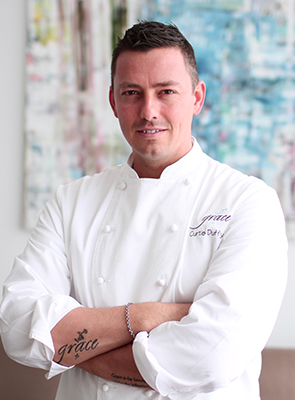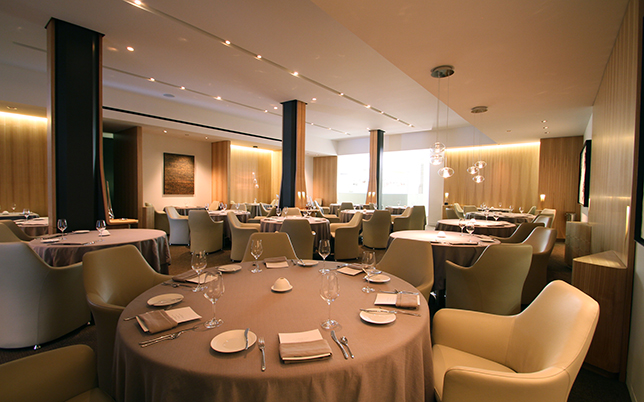
Chicago-based chef Curtis Duffy has worked with some of the best in the world of gastronomy. We’re talking Michel Bras, Grant Achatz and the late Charlie Trotter. After three years at Charlie Trotter’s and a pastry chef stint at Trio (where he met Achatz), Duffy went on to open Forbes Travel Guide Five-Star Alinea as chef de cuisine. In 2008, he took his toque across town to Avenues at Five-Star The Peninsula Chicago. When the Michigan Avenue restaurant closed, Duffy opened the much-anticipated Grace in December 2012.
In its first year of being rated by Forbes Travel Guide, Grace earned Five Stars — quite a feat if you ask us. We recently caught up with the chef to discover what the honor means to him, his favorite ingredients and how he ensures that Grace continues to stand out in The Windy City.
Congratulations on your Five Stars. What does it mean to you to earn this distinction right off the bat?
The entire team is extremely proud. I think we worked extremely hard to put the restaurant together with the vision and the goals of what we tried to achieve. It’s nice to see it come to life; and to be honored with that right off the bat is truly amazing.
 What is Five-Star service to you? What makes a Five-Star restaurant?
What is Five-Star service to you? What makes a Five-Star restaurant?
I think it’s anticipating the guest’s needs. It’s exceeding the needs of the guest. It’s quality service and ingredients — the best ingredients that we can possibly get. It has always been our vision as to search for and find the most unique and freshest ingredients in season, and really try to serve them “in the moment.”
Do you have any favorite ingredients right now?
You could ask me that 365 days a year and I’ll have a different answer. But right now, we’re really excited about these sweet potatoes we’re buying from Ohio. They’re part of one of our vegetable dishes. We have four or five types of potatoes in one dish. The sweet potato itself is kind of the main focus because they’re really young and tender, and really almost fatty without adding any fat at all but very, very sweet at the same time. It’s really nice.
How would you describe your food philosophy?
My food philosophy has been the same for many years. It’s about challenging the guest with ingredients that are very unique but also giving them something that’s very familiar at the same time in every dish. In particular, if it’s a beet course, we want to give them a variety of different types of beets, and then give them something that they maybe haven’t seen or tasted from a textural standpoint or a flavor combination. The overall philosophy is finding the best ingredients, using them and showcasing them in the season, and letting them speak for themselves.
Do you have a favorite dish that you tend to go back to?
For us, we’re constantly changing. Once the dish is out of season, we’re never going to go back to it. We’re never going to put anything on the menu that was on the menu last season even though it was a really, really popular dish. For instance, we had a carrot dish when we first opened that people just went crazy about. People would come to the restaurant just to have that dish or to experience part of that dish. Once the season was over, we took it off the menu. It’s been off the menu for about nine months now, and it’ll never make its way back. A carrot dish will go back on the menu, but it won’t be the same; it’ll be completely different.
What about that carrot dish did people love?
It was one of those dishes that celebrated [carrots]. I think we had, in total, eight different varieties of carrots cooked all different ways, from raw to roasted to cured and smoked. It had a really nice balance to it with passion fruit, mascarpone and pistachios.
In a city like Chicago, where there are so many great restaurants, how does Grace standout?
I think what we do is unique. We stay true to the ingredients. We try not to manipulate them so much. But we’re reaching back into the service end of it. In the last five or six years, service quality amongst most restaurants has taken a backseat, if you will, and become very casual, less refined and mediocre at best. I guess everybody feels like service like that is OK. It’s not great; it’s not bad, but it’s OK and acceptable. For us, we wanted to bring back that service quality and [make you] feel like you’re coming into our house and we’re taking care of you as a guest and you need nothing while you’re here — that’s the idea.
As an alumnus of Charlie Trotter’s, how do you think the late chef influenced your culinary career? What do you think his impact was?
From a culinary standpoint and as a person, his influence was huge on me. The style of the cuisine he was doing when I was there certainly influences what I’m doing today — in the sense of having those relationships with the farmers, having the connection to the land and finding the best ingredients possible, that’s kind of where I get what I get from Charlie. It’s settling for nothing less than the greatest.
Photos Courtesy of Grace and Curtis Duffy

